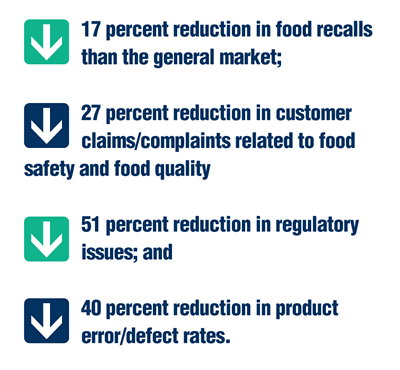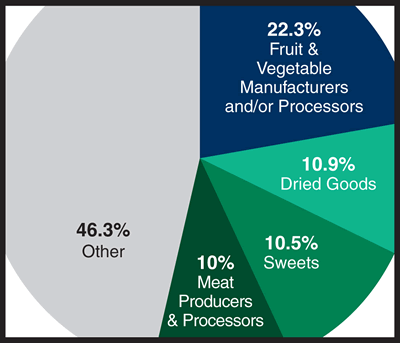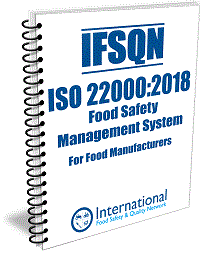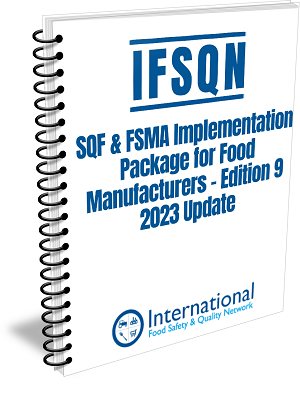- Home
- Sponsors
- Forums
- Members ˅
- Resources ˅
- Files
- FAQ ˅
- Jobs
-
Webinars ˅
- Upcoming Food Safety Fridays
- Upcoming Hot Topics from Sponsors
- Recorded Food Safety Fridays
- Recorded Food Safety Essentials
- Recorded Hot Topics from Sponsors
- Food Safety Live 2013
- Food Safety Live 2014
- Food Safety Live 2015
- Food Safety Live 2016
- Food Safety Live 2017
- Food Safety Live 2018
- Food Safety Live 2019
- Food Safety Live 2020
- Food Safety Live 2021
- Training ˅
- Links
- Store ˅
- More
Advertisement
Featured Implementation Packages
-
ISO 22000 Food Safety Management System - Food Manufacturers Edition - 2018
This is an ideal package for Food Manufacturers looking to meet International Fo... more
-
SQF (& FSMA) Implementation Package for Food Manufacturers - Edition 9 (2023 Update)
This comprehensive documentation package is available for immediate download and... more
Food Safety Certification: A Necessary Investment
Nov 24 2010 09:39 PM | ggansner
gfsi food safety certification
Other issues driving U.S. retailers and manufacturers to focus more on food safety is the increasing complexity of the global supply chain and the large number of products that are sourced from high risk areas such as China, India and Latin America.
Store brands retailers today are keenly focused on food safety, and manufacturer testing and certification. In fact, an industry survey conducted by the Consumer Goods Forum (CIES) in 2007 and again in 2009 found that food safety moved up from the number seven slot to number two in importance among retailers and manufacturers.
Competition also is spurring retailers to be more proactive. In early 2008, Walmart became the first U.S. grocer to adopt Global Food Safety Initiative (GSFI) standards, requiring private label suppliers and select food products companies to comply with standards above FDA or USDA requirements. GFSI requires food suppliers to achieve factory audit certification against one of its recognized standards, which include International Food Standard (IFS) or an equivalent such as Global-GAP, Safe Quality Food (SQF) or British Retail Consortium (BRC).
Then, in the summer of 2009 Target notified all of its store brand suppliers that it required them to become GFSI certified by the end of 2010. When market leaders such as Walmart and Target take action, others follow. More and more U.S. retailers –– such as Supervalu, Publix, Food Lion, Loblaws, Wegmans and others –– have committed to GFSI as well.
CERTIFICATION STANDARDS IMPROVE BUSINESS
While the certification and training process can be somewhat costly and painstaking for both manufacturers and retailers, the good news is that the disciplines yield positive business results, according to a new study conducted by the University of Rostock in Germany. Food processing companies with IFS certification realize dramatic reductions in food recalls, error/defect rates, customer complaints/claims and regulatory issues, according to the research.
The data is compelling. Respondents experienced up to a:

Furthermore, a majority of companies realized sales improvement. In fact, 55 percent saw up to a 10 percent increase in sales; another 14 percent experienced a 10 to 20 percent sales increase.
Furthermore, a majority of companies realized sales improvement. In fact, 55 percent saw up to a 10 percent increase in sales; another 14 percent experienced a 10 to 20 percent sales increase.
PROCESS OPTIMIZATION
In total, 62.1 percent of those surveyed consider the IFS Food standard as “good” and “very good” from a process optimization viewpoint. From management standpoint, 37.9 percent considered IFS Food to be “good” and “very good.” A vast majority of respondents reported that they made investments in IFS Food standards when it was introduced. Of the 89 percent of respondents who made financial investments, 70 percent rated their expenditures as “medium,” 14.5 percent as “low,” and 16 percent as “high.”
ABOUT THE SURVEY RESPONDENTS
Approximately one in five survey participants (22.3 percent) are classified as fruit and vegetable manufacturers and/or processors. Meat producers and processors represented 10 percent of respondents, dried goods 10.9 percent and sweets 10.5 percent. More than one quarter of those surveyed (26.4 percent) are or were also certified under more than one GFSI benchmarked certification. One third still work under a management system certified under ISO 9001, and only 5.4 percent report an established management system under ISO 22000. The environmental management system is managed according to ISO 14001 in 6.3 percent of respondents.

CONSUMER CONFIDENCE
Food safety and certification is a business imperative for manufacturers and processors. If the University of Rostock research is not compelling enough, retailers and manufacturers should consider their most important customer — the consumer, whose confidence in the U.S. food supply chain is shaken.
“Over the past several years, nationwide food safety alerts or recalls involving spinach, beef, peanut butter, chili sauce, tomatoes, peppers, peanut products and pistachios have exposed weaknesses in our food safety net and diminished consumer confidence in the safety and security of the food supply,” the Grocery Manufacturers of America (GMA) wrote in its 2009 white paper on supply chain initiatives to improve food safety titled “Prevention, Partnership and Planning.” The food safety alert and recalls highlight the need to modernize and strengthen the country’s food safety system, according to GMA.
“Food manufacturers are ultimately responsible for providing consumers with safe products and for ensuring that those products meet all applicable standards. However, accredited third party certification bodies can play a critical role in efforts to continually improve the safety of our food supplies,” GMA wrote.
Consumer confidence in food safety remains fragile, according to research conducted in 2009 by the Food Marketing Institute. A majority of shoppers (72 percent) said they are “somewhat” confident in the safety of food in U.S. supermarkets versus 11 percent who said they are “very confident.” The report also found that nearly one third (31 percent) of consumers stopped purchasing a food product because of safety concerns.
Unchanged from 2008, the majority of shoppers (89 percent) trust grocery stores to sell safe food, but have less trust in the government to make sure the food they purchase is safe:
“The USDA and FDA are entrusted to protect the American public from unsafe food and the accompanying illnesses and death. In recent years, that trust appears to have eroded,” according to the Food Industry Center at the University of Minnesota. Food recalls increased 135 percent from 240 to 565 between 2006 and 2008, according to the 2009 Food Industry Report.
Confirmed laboratory cases of foodborne illnesses reported by the U.S. Centers for Disease Control and Prevention (CDC) increased 46 percent between 2000 and 2008, while the number of cases per 100,000 population went up 21 percent from 33 to 40, according to CDC data quoted by the University of Minnesota.
“A lack of, or decline in, confidence in the safety of food can lead to irrational actions ranging from consumer boycotts of product categories to media scares claiming to be documentaries,” the Food Industry Center at the University of Minnesota wrote as part of its food safety and defense tracking project. “It can lead to social causes around food, political pressure for more food inspection and government monitoring, trade restrictions, or a demand for local foods.”
While increased government regulation and inspection may help improve food safety, the best course of action for the food industry is self-monitoring and vigilance.
Food processing companies should consider all of their certification options to ensure they’re choosing what’s right for their organizations. Though third-party certification is not a one-stop shop for the elimination of food safety challenges, the IFS Standard provides a strong basis for prevention and continuous improvement.
The results of the University of Rostock study confirm significant cost savings on many levels through the implementation of the IFS Food Safety and Quality Standard.
Author Biography:
IFS is an umbrella brand for globally recognized standards in food, logistics, household and personal care, broker, and cash-andcarry/wholesale developed by the associated members of the German retail federation, hauptverband des Deutschen einzelhandels (hDe), and of its French counterpart, Fédération des entreprises du Commerce et de la Distribution (FCD), along with input from retailers in italy, Switzerland, poland, Spain, and austria. IFS Food is a global uniform quality assurance and food safety standard accepted under the Global Food Safety initiative (GFSI).
For more information see: www.ifs-certification.com
Contact: George Gansner, IFS north america at 314-686-4610 or by emailing: ifs-us@ifs-certification.com.









0 Comments